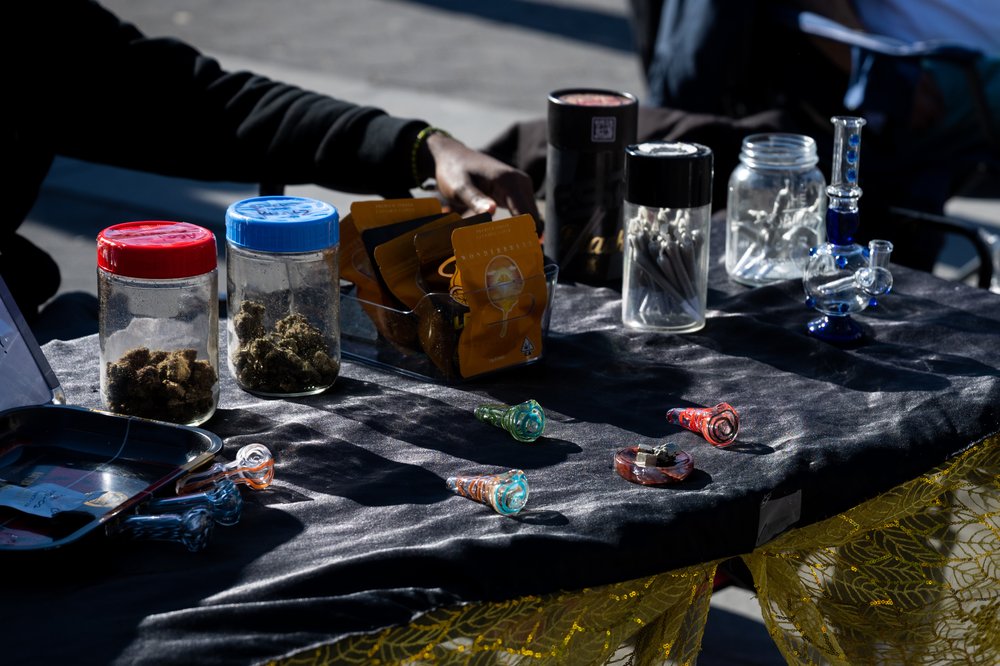Brooklyn can get a legal weed dispensary after judge narrows federal injunction
March 29, 2023, 11:18 a.m.
New York cannabis officials are expected to announce a new batch of licenses for applicants in the state’s social equity program on Monday, meaning a legal dispensary could pop up in Brooklyn in the coming weeks or months.

A marijuana vendor sells flower and pre-rolled joints in Washington Square Park on March 26, 2023. The new federal decision comes as state and city officials try to stop unlicensed sales of weed.
A federal appeals court narrowed a temporary restraining order on Tuesday that blocked certain parts of New York from opening licensed cannabis dispensaries. Legal, retail weed can now be sold in Brooklyn, the Mid-Hudson region, Central New York and Western New York.
The Finger Lakes region is still barred from getting a legal dispensary under court order, for now.
New York cannabis officials are expected to announce a new batch of licenses for applicants in the state’s social equity program on Monday, meaning a legal dispensary could pop up in Brooklyn in the coming weeks or months.
The initial injunction stemmed from a lawsuit challenging New York’s social equity program for cannabis entrepreneurs, which prioritizes licenses for people affected by past weed convictions through the state’s Conditional Adult Use Retail Dispensary program.
A company called Variscite NY One applied for one of these licenses and then filed a lawsuit against the state in September alleging that the owners of the company would likely be denied a license because they didn’t meet the program’s residency requirements. Variscite argued that this discriminated against nonresidents and violated the Dormant Commerce clause of the Constitution.
As a result of the suit, in November, the federal court in New York’s northern district issued an injunction that temporarily blocked state officials from issuing dispensary licenses in Brooklyn and other regions — mere weeks before the retail market launched.
In a motion seeking to lift or narrow the injunction, state officials argued that Variscite actually fulfilled the requirement to have a significant presence in New York by being registered here – but that the company does not meet the criteria for a license anyway. Majority owner Kenneth Gay has a past marijuana conviction in Michigan – not New York, as required under the CAURD program.
The state suggested that if the injunction was not lifted while the case was argued in court, at least it could be narrowed to only apply to the Finger Lakes region, which Variscite listed as its top choice for a dispensary location. The other regions were listed as alternatives.
“For the first time, New Yorkers in nearly every region of the state will have access to safer, high-quality, adult-use cannabis products,” Gov. Kathy Hochul said in a statement on the decision. “I am committed to ensuring New York continues to lead the nation in our safe and equitable approach to the cannabis market."
Brooklyn isn't exactly lacking for weed, though – as it’s home to upwards of 200 shops selling cannabis without a license, NYPD Chief of Patrol John Chell estimated at a City Council hearing in January. Hochul and city and state officials are working to figure out a way to effectively crack down on those shops as licensed dispensaries slowly get up and running.
So far, only a handful of licensed, recreational dispensaries have opened in New York City, and all are located in Manhattan. Hochul announced this week that Queens will get its first dispensary, the woman-owned Good Grades, on Thursday. Licenses have also been issued in the Bronx and Staten Island, although those shops have yet to open.
While the Variscite case makes its way through the courts, New York is also facing a separate legal challenge to its social equity program from companies with medical marijuana licenses here. Earlier this month, they and other applicants waiting on the sidelines to enter the recreational cannabis market filed a lawsuit, arguing that the CAURD program violates the state’s own Marijuana Regulation and Taxation Act.
They argue this law indicates that dispensary applications would be opened up to everyone at the same time. But that suit did not request a temporary injunction blocking the CAURD program from operating while the case is argued.